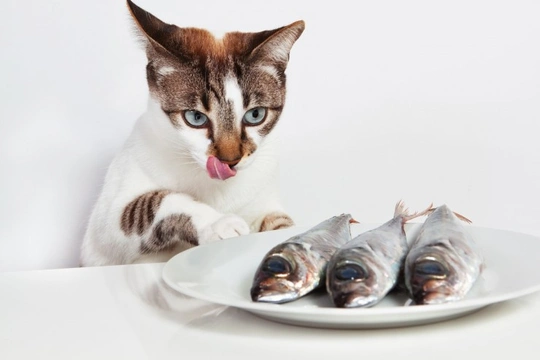
Is feeding fish to your cat a good idea?
When it comes to treats, scraps and food ingredients that you might consider feeding to your cat, fish might seem like one of the options that is automatically safe and probably even healthy for them, and of course, lots of different cat food flavours have a fish theme. However, actual fish itself in all of its various forms is not necessarily as good an option as you might think it should be, and for some cats, being given fish as part of their diet can actually be a problem.
So, is feeding fish to your cat a good idea? In this article, we will lay out some of the potential problems, and what sorts of fish are the best. Read on to learn more.
Some cats are allergic to fish
First things first, along with grains, fish is one of the most common allergenic ingredients for cats-while not a huge proportion of cats are allergic to it, if your cat is prone to allergies, fish could well be one of their triggers.
If your cat suffers from regular or constant low-level digestive upsets, if their coat is dull or patchy or if they often have runny eyes and nose as well as sneezing, you might need to look into the possibility that they are allergic to fish-or something else in their food.
Fish-based cat foods are safe for non-allergenic cats
Assuming that your cat is not one of the small but significant number that are allergic to fish, feeding them a complete cat food that contains fish or is fish flavoured is fine. Complete cat foods are designed to take care of all of their nutritional requirements, and will not be too rich in fish.
However, ensure that what you are feeding to your cat is a complete food and not designed as a treat-some pouches and small tins of cat food that are very rich in fish are designed to be fed in moderation, as a treat, and will be marked as a complimentary food and not a complete one.
Plain fish is usually ok in small portions
Small portions of plain fish of various types are ok to give to your cat as a treat, and in some cases, really stinky fish such as sardines or pilchards will make your cat go wild, and can make it easier to give them medicines hidden within the fish, as your cat will be in a rush to wolf down what you are offering them!
However, portions of fish that are not part of a complete readymade food should only be fed in moderation, as fish contains a whole range of minerals and elements that in moderation, can be fine, but in larger amounts, can actually be harmful-such as iodine, which many forms of oily fish are very rich in.
Fish is also not a natural food for cats, although this comes as a surprise to many people-cats evolved as carnivores catching and eating meat, and fish would not have been something that was easy to come by or an obvious source of food for most landrace and original breeds of cat, and their wild ancestors.
What fish lacks
As well as potentially being too rich in elements such as iodine that can be harmful to cats in large doses or if fed regularly, fish does not contain all of the right vitamins, minerals and elements to make up a complete diet. While fish is like for like very rich in protein, it does not contain everything your cat needs from their meals, most notably, vitamins B and E.
Additionally, how healthy any given fish meal is will greatly depend on where the fish was caught and the conditions that it lived in-some fish that make it onto our tables in the UK are raised in highly unhealthy water sources, which may be full of pollutants and even sewage, all of which will be present as part of the diet of the fish in question.
On top of this, in particularly polluted water sources where fish are caught for food, the fish will be treated with antibiotics to make them fit for consumption, and these antibiotics too will make their way into the food chain. This is particularly common with fish like prawns and other shellfish, and Basa fish or river cobbler, a popular cheap substitute for cod and other more costly white fish.
What sort of fish is best for cats?
Bearing in mind the above caveats on feeding a complete diet and only giving fish as a treat, feeding fish that are rich in omega-3 such as trout, tuna, salmon, sardines and herring is the best option. Keeping a small tin of an oily fish such as sardines can be useful if you need to tempt your cat to eat or give them a pill, but make sure that the fish that you pick is packed in its own juices or plain water, and not sold in salted water or vegetable oil to preserve it.



